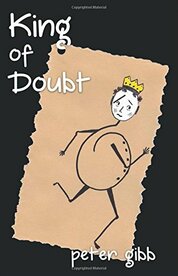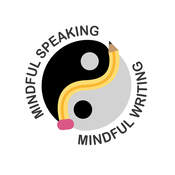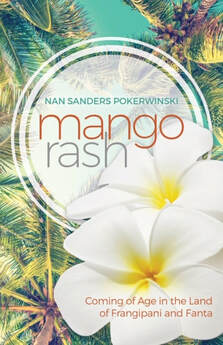 Peter Gibb Peter Gibb I’m happy to welcome Peter Gibb to HeartWood today. I met Peter when I took—and greatly enjoyed—his workshop, “The Joy of Mindful Writing,” at the Pacific Northwest Writers Association conference last fall.  Peter's award-winning 2017 memoir Peter's award-winning 2017 memoir Peter’s award-winning memoir, King of Doubt, is a beautifully-crafted story of self-discovery—a must-read for anyone who’s ever experienced self-doubt. (Is there anyone who hasn't?) When I learned he has a book on mindful conversation in the works, I cleared a space on my bookshelf in anticipation.  As he relates on his website, Peter grew up shy and isolated. Not exactly a conversational whiz. Eventually, though, he caught on to a few secrets that he honed and shared over a 22-year career of teaching, consulting, and coaching conversational skills “on 4 continents, in 3 languages, to Fortune 500 companies, to leaders of the emerging democracies in Eastern Europe, to doctors and bakers and just plain folks, hungry to learn.” I’m honored to have Peter as a guest today. At the end of his post, you’ll find a link to his website, where you can take a quiz to learn your dominant conversational style. I encourage you to check it out. I took the quiz and not only gained insights into my habits in conversation, but also got tips on tweaking those habits toward more effective and satisfying face-to-face communication. Now, here’s Peter . . . First, I’m delighted to be a guest on Nan’s blog. So much interesting talk happening here, and such important topics.  Great conversation brings satisfaction and success Great conversation brings satisfaction and success Is there any human activity that has the potential to bring us contentment and provide real connection, more than Great Conversation? Conversation is a master life skill. Essential for parenting, teaching, leading, making friends, getting along with colleagues, selling . . . you know, just about anything and everything you do will be more successful and more satisfying if accompanied by Great Conversation. But here’s the rub. Not all Conversation. In fact a great deal of conversation isn’t conversation at all. It’s just talk. Talk that does not bring us contentment or connection. Serial Monologue A great deal of talk consists of what I call “Serial Monologue.” This is talk in which two people, supposedly engaged in conversation, are actually just talking heads, listening mostly to their own voices. Rather than paying attention to what the other person is saying, they are more frequently:
Grabbing Response Further, when such talkers do respond to the speaker, the most frequent type of response is what I call a “Grabbing Response.” Here is an example: Person A: “I just got back from a great trip to San Diego with my family. We had a terrific time.” Person B: “San Diego, we were there in fall of ’17, but it was cold most of the time.” Person A: “The zoo was really wonderful. My Clara left saying she wants to become a Vet. I’ve never seen her so excited.” Person B: “Really. We take our kids to the zoo at least once a year.”  Some exchanges are more like football games than conversations Some exchanges are more like football games than conversations Person A is all excited to tell about her vacation, but Person B pretty much disregards everything that A says and launches into whatever story comes to mind. A conversation should be like a dance of connection, but in fact this one is more like a football game, each side trying to grab the ball and score points on some mythical scoreboard. Person B grabs the spotlight from A and changes the topic from A’s vacation to B’s cold vacation in San Diego and how one of the children is going to be a Vet. Instead of creating connection and contentment, this kind of talk fosters isolation and frustration. Neither talker feels heard or acknowledged. There is no real connection. What Ears Can Do We were given two ears but just one mouth. There must be a reason. The most critical ingredient for Great Conversation is “Deep Listening.” The first step toward deep listening is to get rid of grabbing responses and start using “reflective responses” instead. Imagine how different this conversation might have been, had it gone something like this: Person A: “I just got back from a great trip to San Diego with my family. We had a terrific time.” Person B: “You sound so excited. San Diego. What made the trip so exceptional?”  Reflective response is the first step toward deep listening Reflective response is the first step toward deep listening This is a “reflective response.” There are many types of reflective response, too many to go into here. They all validate the speaker, mirroring back some aspect of what the speaker has said and often inquiring for further about the topic. Note that in this particular response, Person B validates a feeling (excited) and then inquires for more detail (what made the trip so exceptional?) There is no telling my own story, or giving advice, or judgment, or distraction. It’s basically listening, reflecting and inquiring. Simple? Well, not always, but what a difference it will make. The Power of Listening Learning to become a more conscious, committed listener is the single most important step you can take to move your conversation from talk to connection and ultimately to “Great Conversation.” So what exactly is great conversation? Well, that’s a longer conversation. The best I can do in this short time is to say that it’s a skill we can all develop. It’s based on four values whose first letters spell the word C.A.R.E.
 If you’d like to learn more about Great Conversation, please visit my web site, http://www.petergibb.org/. Scroll down a bit on the home page, and you’ll see an invitation to take the “Conversational Style Assessment,” a short survey that will help you discover your dominant conversational style. You’ll learn which of four basic conversational styles (Observer, Nurturer, Performer, and Explorer) is your default mode. You’re not locked into any one style for life. You can change your conversational style, but knowing your default style can help you to get oriented and on the path to Great Conversation. Take the assessment and you’ll get a personalized report back from me. I also have a blog that discusses issues of Great Conversation once or twice per month, and a forthcoming (but not for at least 18 months) book, titled Beyond the Weather: 5 Steps to Great Conversation. If you’d like to be notified when the book is released, please sign up on the drop down form on my web site, or email me: [email protected] Thanks for Listening. I hope to visit with you again.
Peter
2 Comments
Sue Schneider
3/23/2019 12:56:22 am
Thanks for the reminder to be a better listener. Great post.
Reply
Nan
3/26/2019 10:38:04 am
I agree, Sue. Always good to be reminded of good listening habits, especially in this age of distraction.
Reply
Leave a Reply. |
Written from the heart,
from the heart of the woods Read the introduction to HeartWood here.
Available now!Author
Nan Sanders Pokerwinski, a former journalist, writes memoir and personal essays, makes collages and likes to play outside. She lives in West Michigan with her husband, Ray. Archives
April 2022
Categories
All
|



 RSS Feed
RSS Feed